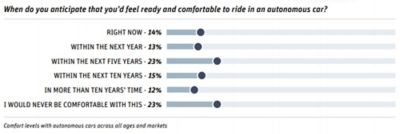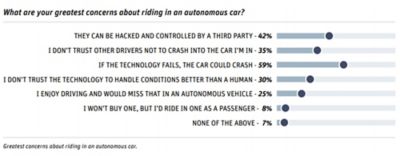-
United States -
United Kingdom -
India -
France -
Deutschland -
Italia -
日本 -
대한민국 -
中国 -
台灣
-
Ansys s'engage à préparer les étudiants d'aujourd'hui à la réussite, en leur fournissant gratuitement un logiciel de simulation.
-
Ansys s'engage à préparer les étudiants d'aujourd'hui à la réussite, en leur fournissant gratuitement un logiciel de simulation.
-
Ansys s'engage à préparer les étudiants d'aujourd'hui à la réussite, en leur fournissant gratuitement un logiciel de simulation.
-
Contactez-nous -
Carrières -
Étudiants et universitaires -
-
S'inscrire -
Déconnexion -
Espace client -
Support -
Communautés partenaires -
Contacter le service commercial
Pour les États-Unis et le Canada
+1 844.462.6797
-
ANSYS BLOG
October 01, 2019
Ansys Validates High Interest in Fully Autonomous Cars, but Concerns Still Remain
An Atomik Research survey commissioned by Ansys finds that 77% of respondents would feel comfortable riding in a fully autonomous car within their lifetime. This survey assesses the public’s opinion of various autonomous vehicles including autonomous aircraft, trains and boats.
When it comes to autonomous cars, specifically, half of respondents think the technology is — or will be — better than human drivers.
These numbers are promising for a young technology. Especially since engineers could one day design a fully autonomous car that is safer than any other automotive option. However, to do so, they must address the public’s concerns about a handful of engineering challenges.
The public opinion of fully autonomous cars leans positive, but not everyone is onboard.
The Public’s Opinion of Fully Autonomous Cars
Over 22,000 respondents, across 11 countries, contributed to the autonomous vehicle research. The findings show that opinions about autonomous cars are not universal. About a third of respondents from India are willing to hop into an autonomous car right now. However, the United States remains skeptical, with 31% stating that they would never be comfortable in an autonomous car.
Global public opinion about fully autonomous cars
Public concerns about autonomous car safety also varies by age. The research shows that 87% of youth (ages 18-24) and 88% of millennials (ages 25-34) are willing to ride in an autonomous car. This is promising for the future of the technology.
However, engineers could face public opinion challenges in the short term as 43% of adults aged 65 or older and 38% of boomers (ages 55-64) say they will never be comfortable in an autonomous car.
These skeptical populations represent a large portion of the potential buyers for this new technology. So, what can engineers do to design autonomous technology that is safer than what is currently on the road?
How to Address the Public’s Concerns with Fully Autonomous Cars
Perhaps the best way to show that fully autonomous cars are safe is to address the leading public concerns about the technology. Therefore, the research survey included a question to dig into the concerns most people have with the safety of autonomous cars.
Consumers’ greatest fears about riding in fully autonomous cars
It turns out that 59% of respondents fear that the autonomous technology can fail — leading to a crash. To address this concern, engineers need to focus on proving the functional safety of autonomous vehicles.
Cybersecurity is another concern. About 42% of respondents are worried about their car being hacked and controlled by a third party. Engineers can alleviate this concern can by teaming up with cybersecurity experts to develop hardline and software securities that will baffle potential third parties.
The next safety concern is that 35% of respondents fear that other drivers will crash into their autonomous car. To address this, engineers need to test that the artificial intelligence (AI) of the autonomous systems will make the safest decision in all conceivable situations.
It's unfeasible for engineers to use physical prototypes to prove that fully autonomous cars are safe from failures, cyberattacks and human drivers. Instead, Ansys Autonomy offers a virtual simulation solution to verify the AI’s responses to all of these situations.
Learn how to use simulation to solve the safety concerns the public has about fully autonomous cars.













